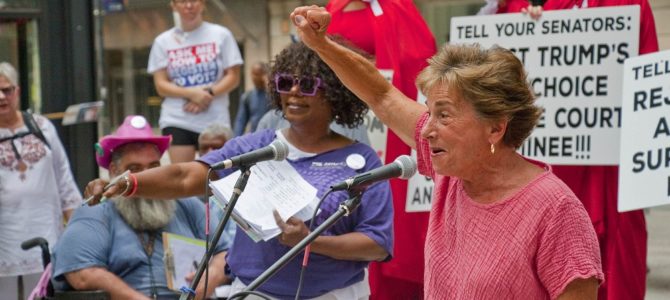
The job of the Senate Judiciary Committee is to vet a Supreme Court nominee and vote on whether the entire Senate can vote on the nomination. It is not a court of law. Consequently, it should not hear testimony from Christine Blasey Ford or Brett Kavanaugh regarding Ford’s allegation of sexual assault. Neither should it recommend that the FBI conduct an investigation.
Here’s the process the committee should recommend that Ford follow instead. I’ll describe a constitutional and practical reason the committee is not the appropriate forum for the Ford matter, and discuss two dangers that could occur if the committee deals with Ford’s allegations.
Ford has a right to be heard. Individuals bringing forth criminal accusations, however, do not testify before the Senate Judiciary Committee about their claims or get to have the FBI investigate their allegations. The U.S. judicial system has a process for dealing with allegations of a crime, and Ford should have to follow it like any other accuser.
Ford should start the judicial process by filing a report with the police. The police would then investigate the allegation. Depending on the outcome of this investigation, an arrest and charge of a crime could occur. Lawyers would present and defend the case. Finally, a judge or jury would weigh the evidence and determine whether Kavanaugh is guilty.
It is important to note that Ford’s claim is not barred by the statute of limitations. Since Ford alleged that the crime occurred in Montgomery County, Maryland, Maryland law would apply. Maryland does not have a criminal statute of limitations for a felony sexual offense. Consequently, Kavanaugh could be tried.
Having Ford go through the judicial process would certainly take time, and, if the confirmation vote occurs before a case against Kavanaugh were adjudicated, he could have already been appointed to the Supreme Court. If he were found guilty and is sitting on the court when the verdict occurs, the Constitution provides a remedy: impeachment. It is a near certainty that, if Kavanaugh were found guilty of sexual assault, he would be impeached, convicted, and removed from office.
The Senate could certainly delay a vote on Kavanaugh until after the judicial process against him ends. It would, however, set a dangerous precedent of delaying votes every time a criminal allegation occurs. That would make it possible that individuals would make false allegations to derail a candidate or postpone a hearing until after an election and possible change in the composition of the Senate.
The Senate committee is not the appropriate forum for Ford’s testimony, for two reasons. First, it would violate the separation of powers, the doctrine of keeping the legislative and judiciary branches separate. The committee is part of the legislative branch, and its job is to provide oversight of the judiciary system.
The courts (such as Maryland state courts) are part of the judiciary branch, and their job is to determine whether an individual is guilty. If the committee were to hear the testimony and act like a court by weighing in on Kavanaugh’s guilt or innocence, the committee would be acting in a judicial function. The committee, therefore, would be violating the separation of powers by acting in both legislative and judicial capacities.
Second, as a practical matter, the committee would not be able to consider the Ford matter like a court would, or be able to sentence Kavanaugh. They would not hear any evidence, results from a police investigation, experts, or cross-examination. The committee’s decision would not be based on a complete understanding of the events, but only on a few hours of testimony from the accuser and accused.
Having Kavanaugh and Ford testify before the committee regarding the sexual assault allegation causes two problems that judicial procedures were created to prevent. First, Kavanaugh and his reputation would be tarnished without the ability for him to defend himself in a court of law. Americans would judge Kavanaugh based on what they hear from Ford and Kavanaugh. Even if the hearing were closed to the public, testimony and details would inevitably emerge. Kavanaugh would not be able to rebuild his reputation.
Second, having Kavanaugh testify would have a chilling effect on other nominees, for both the judicial and other branches of the government. Potential nominees may not want to risk their reputations or the possibility of being required to testify regarding accusations that have not progressed through the judicial system. If potential nominees would not want to serve for fear of the confirmation process, the country would suffer.
The judicial system’s processes, the function of the Senate Judiciary Committee, and the separation of powers were created so that various interests would be balanced and protected regardless of the situation. Kavanaugh’s status as a Supreme Court nominee does not mean that these established procedures and system should be changed.
The solution for dealing with the Ford matter is simple: follow the established procedures. If the committee does so, justice will prevail.








